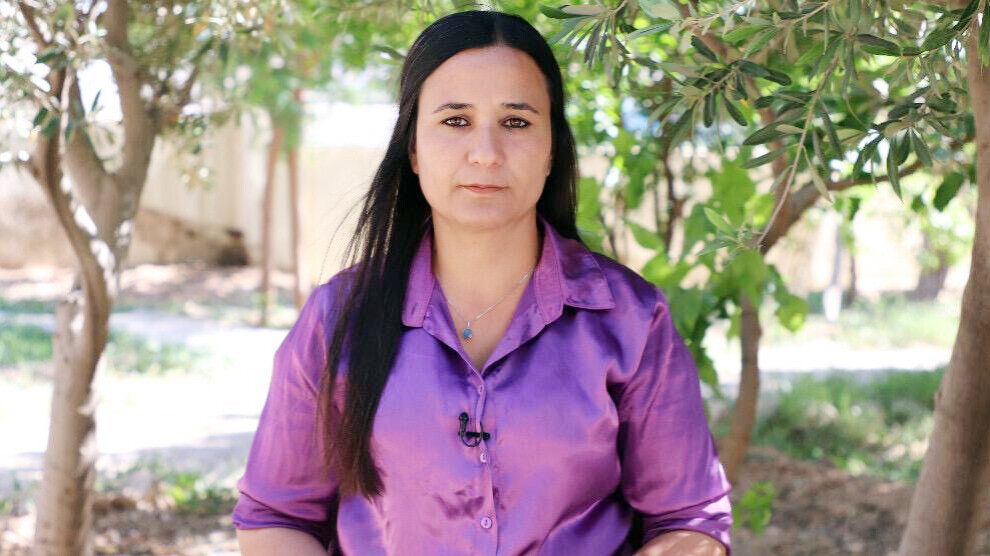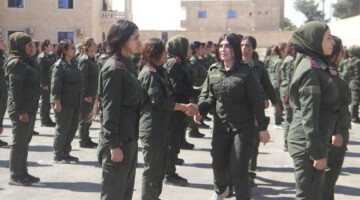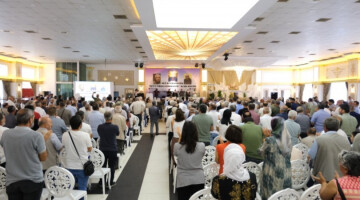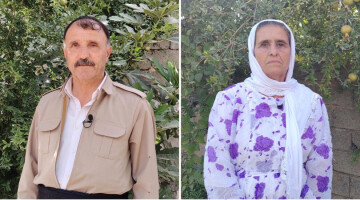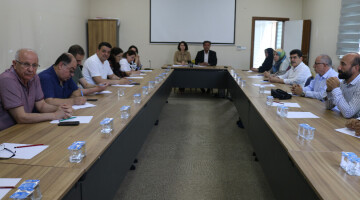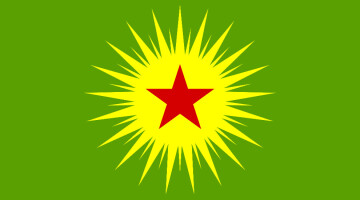The Maxmur refugee camp in South Kurdistan/North Iraq has been under attack by Turkey since 2017. Since July 2019, 14 airstrikes have been carried out on the self-governing camp and its residents displaced from Northern Kurdistan. These attacks killed ten people and injured at least twelve people. The Turkish state most recently bombed the camp on 10 and 16 September. These attacks occurred at a time when Iraqi officials went house-to-house to conduct a census at the request of the UN. Erkan Gülbahçe spoke to Filiz Budak, co-chair of the People's Council of Mexmûr, about the situation in the refugee camp for the daily newspaper Yeni Özgür Politika.
Maxmur camp has been under attack since the day it was founded. The HPG officially announced their withdrawal from Maxmur in 2023. Despite this, Turkey's attacks continue. What is behind it?
Since 1994, the people who now live in exile in Maxmur have repeatedly been the victims of attacks and massacres. A justification is found for every attack. None of these justifications corresponded to the truth; they were all based on lies and deception.
In 2014, at the request of the Iraqi central government, the residents of the Maxmur camp and the government of South Kurdistan, guerrilla units of the HPG and YJA Star came to the Qereçox region near Maxmur and protected the civilian population from ISIS. There were many casualties. The Turkish state and its supporters did not want to accept the presence of the guerrillas and increased their attacks. Schools, playgrounds, mosques and houses were directly attacked and bombed by unmanned aircraft. Many civilians lost their lives. During these attacks, attempts were made to portray the camp as a military camp.
To refute this justification, the HPG and YJA Star issued an official statement in October 2023 announcing that they had withdrawn from the camp. However, the Iraqi government, the government of South Kurdistan and the Turkish state continued to put pressure on the camp, despite knowing full well that the guerrillas had retreated to the Medya Defense Areas. Their main goal was to destroy the camp, which was organized within the framework of the Democratic Nation paradigm. Only a week ago, a house was attacked, with children playing nearby. It was the house of the Peace Mothers, who are working for peace and an end to the massacres.
For us, these attacks mean: If you are Kurdish, if you do not accept state policy and oppose oppression and tyranny, you will always be the target of the Turkish state. Anyone who does not submit to the state and wants to live a free life, who wants to speak their language, live their culture and defend their identity, is threatened with state persecution and massacres.
A very broad attack concept has been developed against the Kurds. Regardless of whether you are in Rojava, South Kurdistan, Shengal, North Kurdistan or even in another country in the world, if you do not accept this concept and sympathize with the Kurdish freedom struggle, you are always a target of attack. If you fight to assert your Kurdish identity in the world, if you defend the ideas of Rêber Apo, the democratic, ecological and women's liberation paradigm, you are in the sights of the invaders. These attacks are aimed at eliminating the order that prevails in the Maxmur camp.
The camp is the first place where the Kurds formed a system and became a power. The greatest danger for the enemy is that the Kurds organize themselves according to the ideas and ideologies they themselves developed and govern themselves. For 30 years, Kurds in Maxmur have been organizing, resisting, defending and living their culture. In a sense, they are offering radical resistance to oppression, tyranny, massacres and the borders drawn for Kurds by the Turkish state. It is precisely for this reason that Maxmur has been in the sights of the Turkish state for 30 years.

How should we interpret the fact that the latest attack took place at a time when the Iraqi Ministry of Migration and Immigration was on site?
The UN has commissioned officials from the Iraqi Ministry of Migration and Immigration to work in the Maxmur camp. It is, of course, significant that the attack took place during this period. In fact, since 2014, the UN has been pursuing a policy of stalling and deceiving the camp residents. They keep saying: 'The camp is a military camp, it is not a safe area. That is why we cannot come there and work.' Maxmur, like many other refugee camps around the world, is under the control of the UN organization. While other camps have security, education, health and economic services, Maxmur has not provided them for the past ten years due to security reasons. Even the validity of the UN-issued ID cards that allow refugees living in the camp to work outside is not being extended.
The UN has backed down and has now sent officials from the Iraqi Ministry of Migration and Immigration to the camp to conduct a census and identity check of the population. It said that it would return afterward and restore the camp's refugee status. Just as the census was being carried out, the latest attack took place. The aim of the attack was to make Maxmur look like a military camp, to criminalize it and thus prevent the UN from returning. The Iraqi delegation was in the camp at the time of the attack and saw with their own eyes which areas were attacked and how.
You said that the camp will be handed over to the UN after identification. Could you explain this a little more?
Maxmur camp has officially been under the status and organization of the UN since 1995. But as I mentioned, the United Nations has not fulfilled its responsibility for the camp since 2014. They have an office in the camp but no staff, they do not even hang their flags. Turkey is putting pressure on the Iraqi central government, and the Iraqi central government is putting pressure on the UN. Maxmur is an important topic in all the meetings that Turkey holds in Iraq. The Iraqi central government complies with Turkey's demands and prevents the UN from fulfilling its duties towards the camp.
At this point, the United Nations promises that it will fulfill its obligations once all residents have filled out a refugee form and their identities have been verified. The camp management welcomes this latest development. Officials from the Iraqi Ministry of Migration and Immigration have been working to register people for more than two weeks, and half of the population has been identified so far. The application forms have already been filled out. If Iraq does not give in to Turkey's pressure or if there is no other political orientation, the United Nations will return to the camp afterward. If the UN is present again, Turkey's air strikes will be prevented.
As you said, Maxmur camp is within Iraqi borders and is under the auspices of the UN. What is the attitude of the UN and the Iraqi central government to the attacks by the Turkish state? Do you think there is enough response to the attacks?
Since 2017, Turkey has been monitoring the camp 24/7 with drones. It has carried out air strikes on refugees on several occasions, depriving children of access to education and residents of access to health services. Despite all this, neither the Iraqi central government nor the UN have shown any reaction. The territory of the Iraqi state is being bombed, but the government only makes weak statements from time to time. The UN also makes statements sometimes but does not take any concrete action against the attacks. After the recent agreement between Ankara and Baghdad, the Iraqi government has remained completely silent. There seems to be a tacit agreement between Turkey, the Iraqi central government and the UN.
Have you taken any legal initiatives at the international level in connection with the attacks on the camp?
We have had some discussions in Europe and applications have been made to various institutions, including the European Court of Human Rights and the UN. Letters have been sent to relevant international organizations. There have been discussions with UN representatives in Geneva. In addition, campaigns to close the airspace over Maxmur have been organized and meetings have been held with the Iraqi central government, but no results have been achieved. I say that there are no results because the camp is controlled from the air 24 hours a day. The attacks continue.
The camp was subject to a strict embargo for a while. Is this embargo still in place?
The embargo has been in effect since July 2019 and is enforced by the KDP and the Barzani family at the request of the Turkish state. The borders of South Kurdistan are closed to the people of Maxmur. In particular, we cannot enter and leave the areas controlled by the KDP. This is to prevent young people from going to Southern Kurdistan to study and to prevent the camp residents from working there. Currently, we mainly go to the areas controlled by the Iraqi central government to supply the camp with essentials.
How do the attacks and the embargo affect the people of Maxmur, especially the children?
Undoubtedly, the attacks and the embargo affect children the most. Small children cry and panic when they hear a noise. The children constantly look up to see if there are any reconnaissance planes flying. At every little noise, they think it is a drone and run away. The attacks cause psychological problems and anxiety in children. They do not feel in a safe environment. The embargo also affects the children the most in terms of education and nutrition.
The aim of this embargo is to intimidate the people in the camp, to put pressure on them and to alienate them from their culture. We are resisting it because we want to live with dignity. No one in the camp makes compromises, everyone is united on this issue. When there is an attack, everyone comes there immediately to find out what happened to whom and how they can help. A culture of mutual acceptance and support, a moral and political society, has developed here. Instead of saying "it's none of my business", everyone sees themselves as responsible and strives for solidarity. After each attack, the idea that a democratic civilization must evolve is reinforced. The only thing that is not limited in Maxmur is human will, resistance, dignity and the determination to keep people alive. We will not compromise. The residents of the camp will continue the path taken by Rêber Apo to the end and continue their struggle by organizing themselves according to his example.
What about education and healthcare in the camp? How do the attacks and the embargo affect it?
Of course, the attacks have had a serious impact on healthcare, the education system and economic conditions. Between 2003 and 2019, health, education and economic needs were solved throughout South Kurdistan. During the Corona pandemic, there were very serious health problems. The KDP Peshmerga prevented sick people from entering Hewlêr, so dozens of people died on the streets. We even had difficulty obtaining medicine.
There is a health center in the camp that is under the control of the Iraqi central government. This health center only treats outpatients. It is open four hours a day. Sometimes a doctor comes and sometimes not. In a camp where 12,000 people live, this is very inadequate. There is no hospital that performs operations. There is not even an ambulance. Sick people are cared for by their families and individuals. It would not be an exaggeration to say that there is no health service in the camp.
The education offered in the camp ranges from first grade to high school. There are no problems in this regard. People have set up schools on their own. They have their own curriculum and their own teachers. After that, it becomes difficult because since 2019 no one from Maxmur has been admitted to a university in Southern Kurdistan. We have repeatedly appealed to the Iraqi central government so that the young people can study; dozens of applications have been made, but so far we have not received a positive response.

